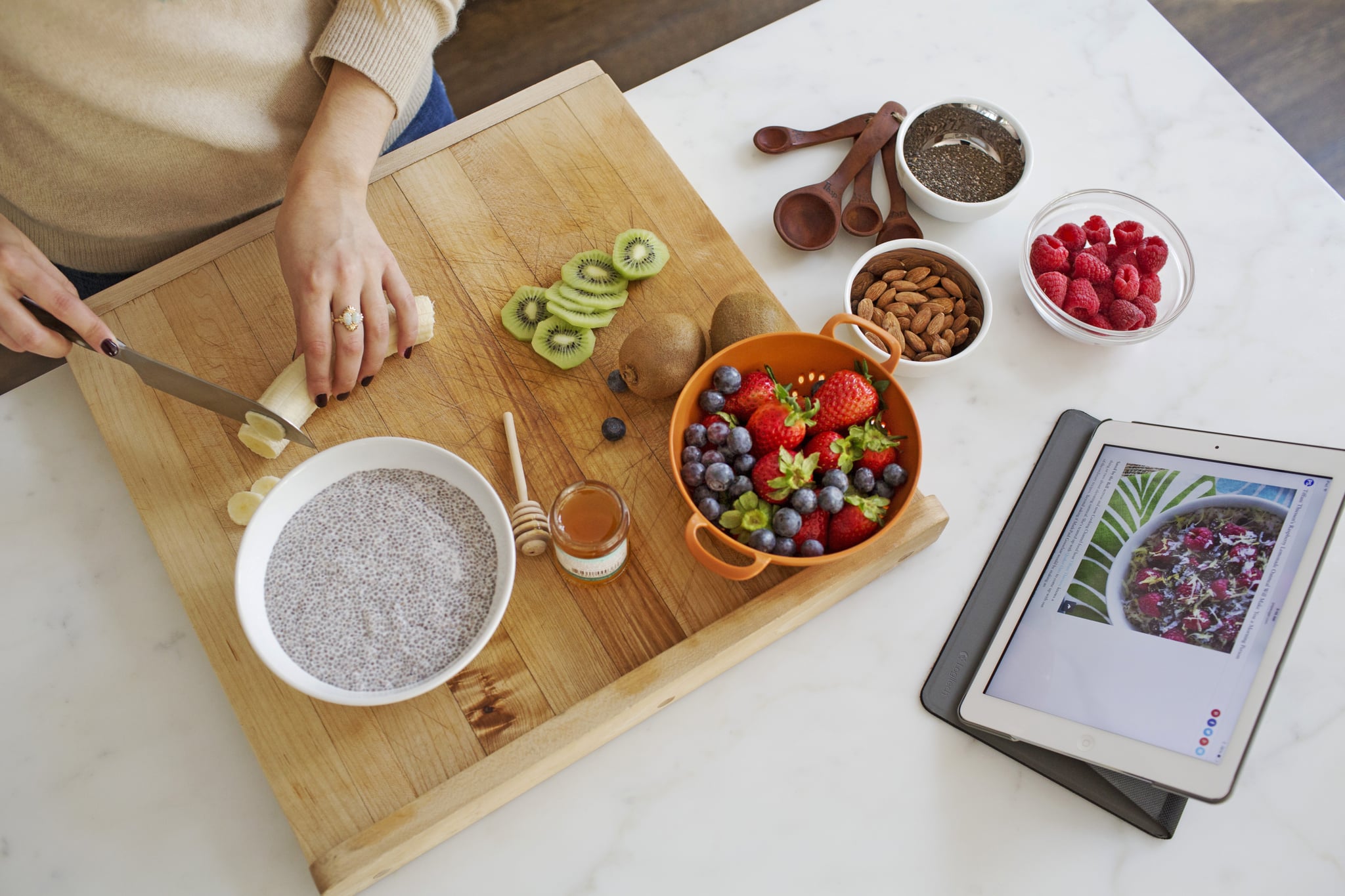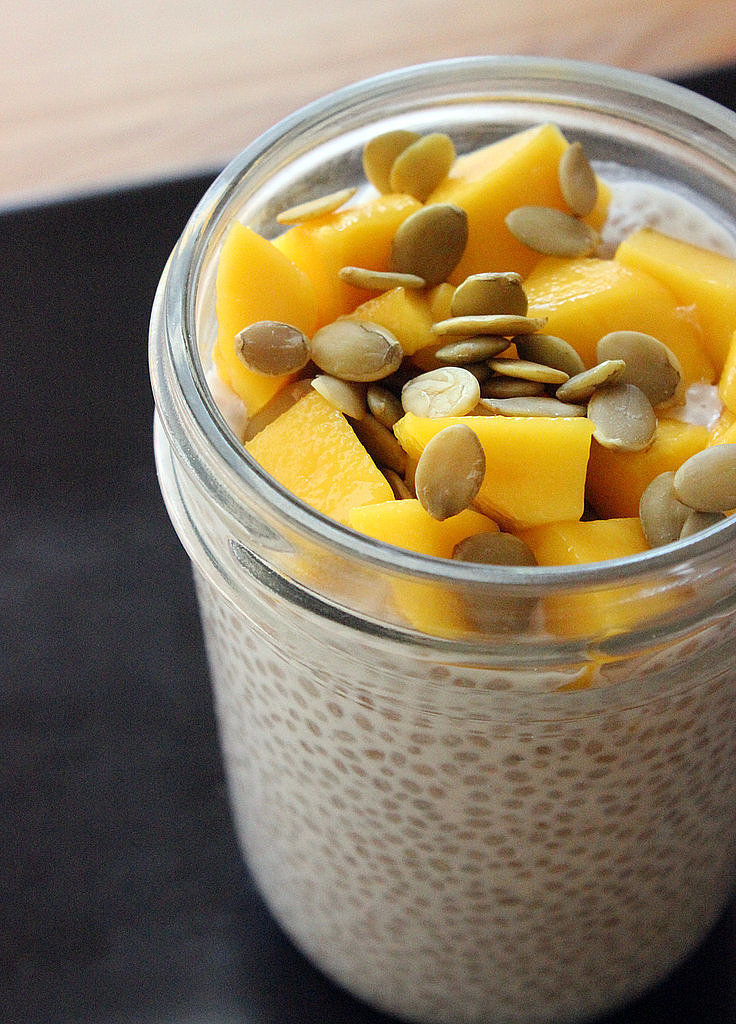Chia seeds have become a popular health trend today, mostly due to the high protein, fatty acids, and fiber content found in these seeds. While all three of these factors are true when it comes to looking at what chia seeds can offer the body, there are much more to consider in terms of the nutritional provisioning that chia seeds provide.


There's good reason chia seeds have been on everyone's minds these days. These tiny seeds are high in protein, fiber, calcium, antioxidants, and omega-3s, but there is a right and wrong way to eat them, and one man learned the hard way.

In one patient case study, one man experienced intense dysphagia, or difficulty swallowing, after ingesting a tablespoon of dry chia seeds and chasing it with water. One of the reasons chia seeds are touted for weight loss is because they expand multiple times their size in water and help you feel full for longer. However, taking down a dry tablespoon and chasing it back with H2O is not going to lead to a comfortable experience, since they don't have time to reach your stomach to expand.

When they're included in a recipe, our bodies can digest chia seeds whole (an appropriate quantity, of course), soaked, or ground in order to reap their healthy benefits. If you're ready to get these nutrient-rich seeds into your diet, these recipe ideas will help you out.
Chia pudding: Chia seeds and coconut milk marry for a Paleo-friendly make-ahead puddingthat works great for breakfast. Mix together the ingredients the night before, pop it in the fridge, and look forward to a special treat the next day. It's that easy.
Debloating beverage: If you've been feeling sluggish and bloated, it's time for a new morning ritual that includes chia. Celebrity trainer Valerie Waters starts the day with this before-breakfast, pre-workout drink that only calls for three ingredients. These chia seeds are combined with water, making this a much safer alternative to consuming chia and chasing it down with water.
Blueberry chia muffins: Blueberry muffins get an upgrade with this chia-filled recipe for extra nutrient power. They're baked into the batter, so you can't even taste them.
Antioxidant berry smoothie: If you find their crunchy texture a little off-putting on their own, try tossing them into this refreshing morning smoothie. High in vitamin C and boasting more than 10 grams of fiber, this antioxidant breakfast blend will become your new favorite recipe.
Sprinkled on yogurt: If you're looking for a quick omega-3 punch in your snack, you can simply sprinkle a teaspoon of seeds on your fruit, mix them into your yogurt, or make a delicious combination of the two!
Let’s break down chia seeds and see what exactly this particular superfood is really made of – and what particular nutrients it can really offer you when you decide to eat a spoonful or two of the seeds on a daily basis.
First of all, chia seeds are relatively high in calories. This, however, does not mean that they will actually contribute to weight gain. An approximate two tablespoons worth of chia seeds contain around 138 calories. When it comes to 100 grams of chia seeds, then the calorie count goes up to 486 calories in total.
This is a breakdown of the content found in chia seeds:
6% of water content
19% of the protein content`
34% of fat content
46% carbohydrate content (about 83% of the carbohydrates are fiber content)
A 100-gram container of chia seeds would contain the following nutritional content:
16.5 grams of protein
42.1 grams of carbohydrates
34.4 grams of fiber
30.7 grams of fat (3.33 grams saturated fats, 2.31 grams monounsaturated fats, 23.67 grams polyunsaturated fats)
17.83 grams of omega-3 fatty acids
5.84 grams of omega-6 fatty acids
There is no sugar in chia seeds. Furthermore, there is a very small amount of trans fats as well – about 0.14 grams per 100 grams chia seeds. Chia seeds do not contain any gluten, making these the perfect snack choice or health product for people who have gluten sensitivities.
The majority of the fiber content that is found in chia seeds are considered insoluble fiber. This is a very useful type of fiber that has been found to reduce the risk of many diseases, including diabetes. Furthermore, the fiber content in chia seeds may assist with increasing the production of short-chain fatty acids in the stomach, which can assist in improving digestive health and function.
It should be noted that there is also a large variety of minerals and vitamins that are found in chia seeds. This is an important factor as the body relies on these nutrients for cells to function normally and for the body to be healthy in general.
The minerals that are found in chia seeds include:
Iron
Copper
Manganese
Selenium
Magnesium
Phosphorus
Calcium
There are also certain plant compounds that are found in chia seeds. These plant compounds are known as powerful antioxidants and can help to fight against free radical damage in the body. The particular plant compounds that have been found to exist in chia seeds include:
Kaempferol
Caffeic acid
Quercetin
Chlorogenic acid
The compounds have been shown to help reduce blood pressure, as well as reduce inflammation in the body. Some of these antioxidants may also help to reduce a person’s risk of developing some cancers, and may also help to reduce the risk of many chronic diseases that affect the human body.
Benefits of Chia Seeds – Are They Good for You?
Chia seeds are popular for a good reason – these little seeds are packed with essential nutrients, ranging from minerals and vitamins to protein, fiber, and even essential fatty acids. These nutrients, along with the plant-based phytochemicals found in these seeds, contribute to quite a number of potential benefits associated with a person’s health. In this post, we take a look at some of the most important benefits that chia seeds have in store for a person who adds this superfood to their daily diet.
High In Antioxidants
One of the primary benefits of chia seeds would be the fact that the food is high in antioxidants. Most of the antioxidants come from plant-based compounds that are often referred to as phytochemicals. Antioxidants are molecules that can help to protect the body against damage by free radicals. Damage dealt with the body by free radicals has been linked to a large number of chronic diseases – including one of the biggest killers, being cancer.
High In Fiber
Fiber is another important compound found in chia seeds that contribute to the many health benefits associated with this particular superfood. Fiber should be an important part of your diet. The majority of carbohydrates found in chia seeds are made up of fiber content, which means loading up on chia seeds contribute to your daily fiber intake as well. This can help improve your digestive health and even be useful in cases where you struggle with issues like constipation. Furthermore, fiber can also help you feel full for a longer period, which can reduce your food intake – this is useful if you find yourself binging on unhealthy food during the day.
Protects The Cardiovascular System
Chia seeds are high in protein, omega-3 fatty acids, and fiber. Combine these with the potent antioxidants that are found in chia seeds, and you get a number of benefits for your heart health as well. Triglyceride levels can be reduced with the frequent consumption of chia seeds, and HDL cholesterol levels can be elevated. This is already really good for the heart. Additionally, chia seeds can also help to reduce inflammation in the body – inflammation is known to contribute to the development of cardiovascular diseases greatly.
Stabilizes Blood Sugar
Insulin resistance and diabetes are two conditions that are of great concern in the modern world. Chia seeds may help lower blood sugar, which can be useful for individuals who are struggling with elevations in their blood sugar levels. In addition to being useful in reducing blood sugar levels, it has also been found that chia seeds may assist with improving the body’s insulin sensitivity. This is definitely another important benefit that should be taken into account. Improvements in insulin sensitivity can assist in reducing the risk of insulin resistance developing.
Reduces Inflammation
Chronic inflammation is another important factor that is causing concern in the general population. This problem contributes to many diseases, including digestive problems, diabetes, heart disease, and more. The compounds that are naturally found in chia seeds may be useful in reducing chronic inflammation affecting the body, reducing the risk of all conditions associated with lower-grade inflammation.
Share...
No comments:
Post a Comment